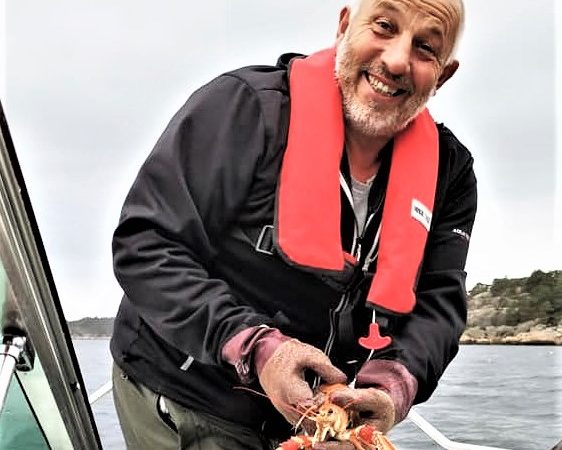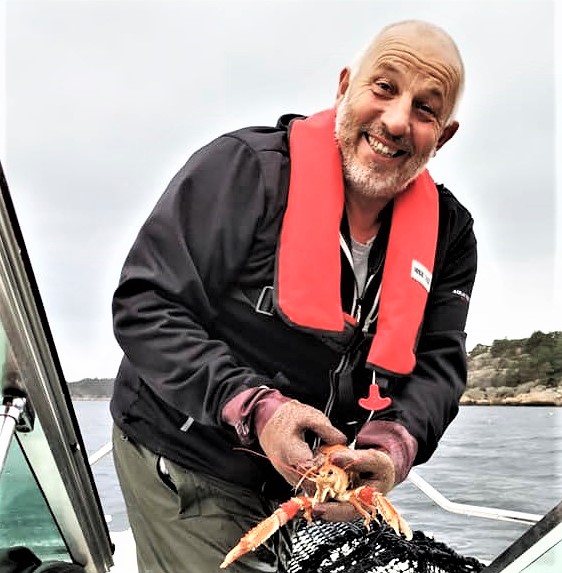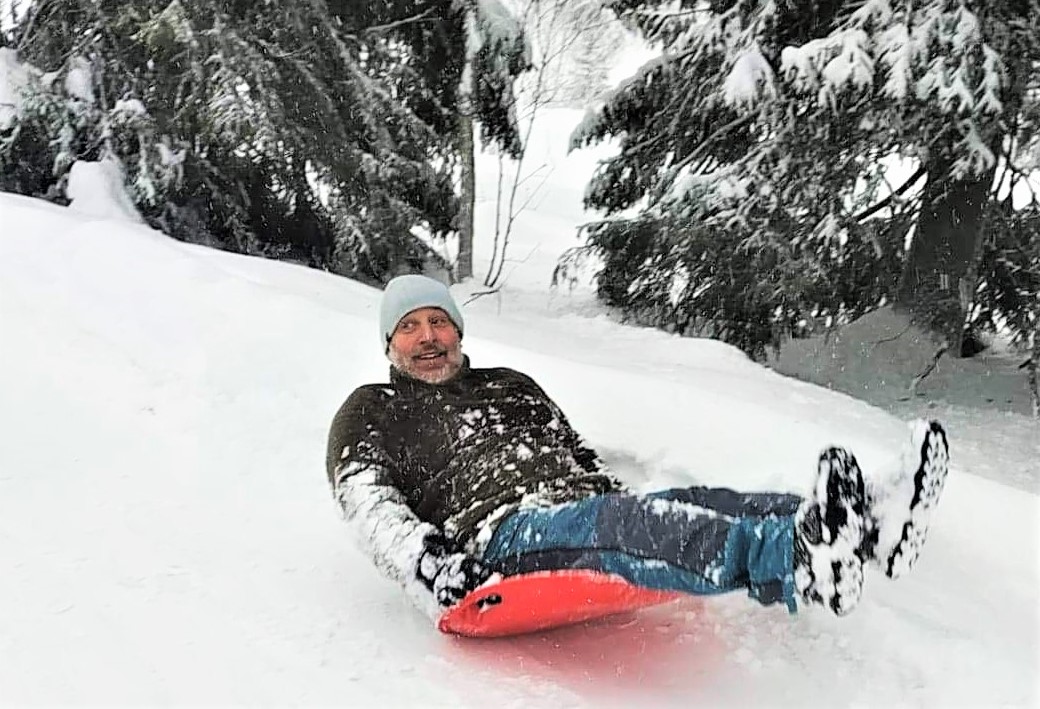– Jeg brenner for likepersonsarbeidet

– Likepersonsarbeidet er ekstra givende når folk åpner seg opp og stiller meg spørsmål, sier likepersonskoordinator i Innlandet, Roar Olafsen fra Roa på Hadeland.

Brenner for likepersonsarbeidet. Roar jobber som likepersonskoordinator i Innlandet. Han jobber aktivt for å få sykehusene i området til å få kjennskap til det verdifulle likepersonsarbeidet til Momentum. Han utfører gjerne samtaler på sykehus og rehabiliteringssentre så ofte som mulig. På bildet er han på hummerfiske på Hvaler oktober 2020.
– Likepersonsarbeidet er ekstra givende når folk åpner seg opp og stiller meg spørsmål, sier likepersonskoordinator i Innlandet, Roar Olafsen fra Roa på Hadeland.
Etter amputasjonen har Roar rukket å jobbe som likeperson i halvannet år. Han utfører samtaler på rehabiliteringssentrene på Ottestad og Landåsen. Her jobber han fast en gang i måneden.
– Jeg hadde selv hodet fullt av spørsmål som jeg ikke fikk svar på da jeg lå på sykehuset. Derfor er det ekstra fint å kunne hjelpe andre til å få en bedre start rett etter en amputasjon. Ønsker vedkommende å prate flere ganger, hender det at de ringer meg. Jeg tar imot spørsmål over telefon i helger og på kvelder, sier han.
Terrengsykling og Birkebeinerrennet
Det første spørsmålet Roar stilte seg etter amputasjonen, var om han kunne være aktiv igjen på terrengsykkel. Rett før amputasjonen hadde han kjøpt seg en ny sykkel. Han er også en reser på langrenn og drømte om å gå Birkebeinerrennet flere ganger.
– Med støtte og rådføring fra folk i Momentum, vet jeg at dette er fullt mulig igjen. Kroppen min trenger først tid til å herde seg etter amputasjonen. I vinter ser jeg fram til å stå på langrenn på flatmark, sier han.

Roar Olafsen amputerte beinet for 3 1/2 år siden. Han har alltid vært svært aktiv og forsøker å gå lange turer med protese. Håpet er å klare å sykle terrengsykkel igjen i tillegg til å gå Birkebeinrennet
Givende å hjelpe andre
– Selv om likepersonsarbeidet er ulønnet, får jeg mye tilbake av brukere som er fornøyd med å få svar på spørsmål og lettet tankene sine. Møter jeg noen som er veldig tenksom og stille, tar jeg ofte initiativ til å spørre dem om hva de ønsker å prate om. Når de først åpner seg opp vil de gjerne vite om alt mulig.
– Som oftest har de spørsmål om tilpasning av proteser og hva som kommer til å skje videre. Jeg er nøye på å undersøke om de har ringt ergoterapeut og sosionom. Jeg lytter og forsøker å få dem til å forstå at det finnes mange støttende personer der ute som ønsker å hjelpe dem opp og fram.
Amputerte etter en fallulykke
Selv amputerte Roar beinet midt på leggen for tre år siden etter en fallulykke fra taket. I fallet landet han på begge beina før han tok seg imot med håndleddene. Den eksisterende hofteprotese etter en dykkerulykke som 30-åring, gjorde at han knuste det høyre beinet i fallet. Han ødela også begge håndleddene, som gjør det vrient å ta tak i ting.
Savnet viktig informasjon
Etter ulykken våknet Roar på sykehuset på Gjøvik hvor han fikk stabilisert beinet med bolter og ståltråd. Grunnet en ujevn hjerterytme ble han sendt rett til Ullevål sykehus.
– Det var først da jeg ble videresendt fra sykehuset på Gjøvik til Ullevål at jeg fikk snakke med en sosionom og fysioterapeut. De informerte om at det hadde utviklet seg koldbrann i beinet. Grunnet de høye medisinene forstod jeg ikke hva en amputasjon betød, sier han.
Meldte seg inn i Momentum
Først da Roar ankom rehabiliteringen på Bakke Unicare, kom han i kontakt med leder og likepersonskontakt for Momentum Øst, Steinar Hansen.
– Steinar spurte meg om jeg hadde lyst til å melde meg inn i Momentum. Han lurte også på om jeg ville bli likeperson, og tilbød meg et likepersonskurs over en helg på Comfort Hotel på Flesland i Bergen. Dette synes jeg hørtes veldig spennende ut, sier han.
Tilbud på sykehusene
Roar kjører i dag lange strekninger med bil for å få til nye samarbeid med ulike sykehus.
– Selv har jeg planer om å få til et tilbud tidlig i 2021, både på sykehusene på Gjøvik, Lillehammer og Elverum. Jeg arbeider som likeperson på rehabiliteringen. Erfaringsmessig er det nyttig å ha en likeperson på sykehusene. I Momentum er vi hele 15 likepersoner som er klare for å snakke med nyamputerte. Planen er å gjennomføre et nytt kurs for disse, slik at de kan plasseres på de de ulike sykehusene. Tanken er at den amputerte får snakke med en likeperson med tilvarende amputasjon som kan dele gode råd og erfaringer, sier Roar.
Brukt totalt 34 proteser
I løpet av tre år som amputert, har Roar allerede anvendt 34 ulike proteser. Antallet er ikke veldig høyt sammenlignet med andre protesebrukere han prater med.
– Spaserer jeg for langt forsvinner beinet ned i protesen slik at jeg raskt må bytte protese. Jeg har nok erfaring til at jeg kjenner på beinet når jeg må skifte. I dag anvender jeg fire ulike proteser om dagen, med ulik tilpasning til beinet. Jeg ønsker først og fremst at protesen skal fungere tilstrekkelig som et ordentlig bein.
– Takket være likepersonarbeidet og alle menneskene jeg har pratet med, har også de negative tankene mine forsvunnet, sier Roar fornøyd.
Les mer om likepersonstilbudet
Les flere reportasjer med likepersoner i Momentum
Verdifullt og lærerikt likepersonsarbeid – Momentum
– Mange amputerte ser for seg et liv i rullestol – Momentum
– Svært givende å være til hjelp – Momentum
Målet er å inspirere alle amputerte til en aktiv hverdag med protese – Momentum
– Det er nødvendig å ta imot all den hjelpen du trenger – Momentum
Likepersonskoordinator Mark Miller sprer viktige budskap – Momentum
Inspirerende og oppmuntrende likepersonsarbeid – Momentum